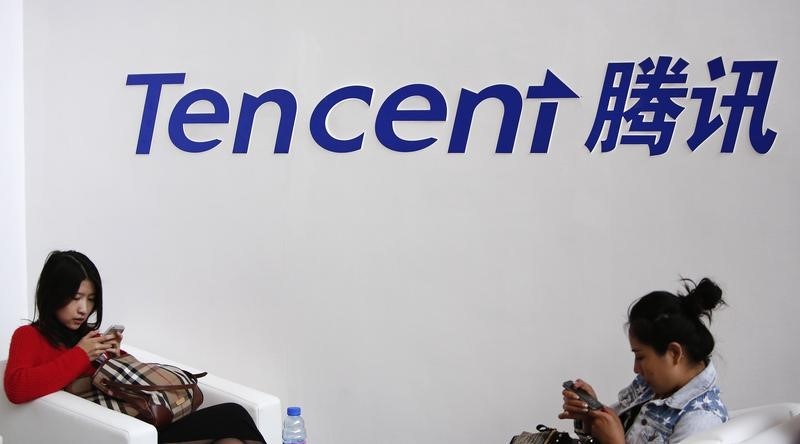By Denny Thomas and Michelle Price
HONG KONG (Reuters) - A heavily discounted purchase of a loss-making solar-panel maker last week has cast a spotlight on the Chinese takeovers of so-called listed shell companies in Hong Kong, which may be used to sidestep the bourse's rigorous listing process.
China's No.1 social network and online media company Tencent Holdings Ltd (HK:0700) and developer Evergrande Real Estate Group joined forces to purchase Mascotte Holdings Ltd <0136.HK> for $97 million, a 97 percent discount on the target company's market capitalization.
Tencent is likely to inject some of its newer businesses into the acquired listed company, hoping its market value would grow as a Hong Kong bull market continues, analysts and a person with knowledge of the matter said.
While Tencent and Evergrande's investment pales compared to Tencent's $187 billion market value, the deal highlights a booming grey market in Hong Kong's so-called shells, listed companies that no longer have material business operations or assets.
Several bankers and lawyers said demand for these assets had soared in recent months as companies and individuals rush to cash-in on Hong Kong's record-breaking rally.
Tencent and Evergrande declined to comment.
Purchasing a shell allows a company or individual to acquire a listing, a highly valuable money-raising vehicle, without having to go through a lengthy and onerous IPO procedure.
"What you are side stepping is the IPO process, which is quite long in Hong Kong and you are sidestepping the regulatory elements of the process," said David Smith, head of corporate governance at Aberdeen Asset Management.
"That is where the weakness is: as a shareholder you don't get the level of disclosure that you get in an IPO," Smith, who helps manage $115 billion for Aberdeen in Asia, said.
One key Hong Kong stock exchange requirement, for instance, is for IPO candidates to have had three consecutive years of profits.
"This is a quick and cost-effective way to help grow your young businesses without relying on the main listed company for funding needs," said Richard Ji, a Hong Kong-based founder of Allstars Investment Ltd, who manages about $750 million.
"These young businesses are usually loss making but once you become part of a listed entity in Hong Kong, it makes it easy to raise capital to finance future growth," Ji added.
Nearly 140 Hong Kong-listed shell companies were bought between January 2013 and April 2015, according to a study done by Timothy Shen, chief investment officer of money manager World Tops Alliance, who wants to become a serial "shell company buyer."
Shen has launched a deal to buy a property services company and convert it to an e-commerce firm: "For us, this is an ongoing, long-term business model."
MARKET CRAZY
Another equity capital market lawyer said demand for shells had gone "crazy", adding that he is currently working on two such deals. The market rate for a shell has risen significantly in the past two years and now stands at between HK$300 million ($38.7 million) and HK$500 million, depending on the nature of the shell and its compliance history, he said.
Purchasing a shell is, however, far from straightforward and carries risk for the acquirer.
Deals have to be carefully structured so as not to trigger the Hong Kong stock exchange's reverse takeover clause, the threshold for which depends on the nature, size, and timing of assets injected.
Deals classed as reverse takeovers must jump regulatory hurdles that are on a par with those of a normal IPO, although a reverse takeover is still considered a faster route to market.
In a statement, the HKEx said that shell purchases that do not trigger the reverse takeover clause may still be subject to "enhanced disclosure and vetting" and added that it had "conducted a number of reviews of the rules in recent years to improve the regulation of reverse takeovers and backdoor listings, and will continue to do so".
Shen's data also suggests that some shell acquisitions help to reinvigorate failed companies, benefiting long-term shareholders who had seen the value of their holdings dwindle.
On average, his sample of stocks have risen 130 percent where the acquirer has bought more than a 50 percent stake, according to the study. That compares with a 20 percent rise in the benchmark Hang Seng share index (HSI) in the same period.
Nevertheless, some corporate governance experts said these deals leave investors in the dark over the nature of their holdings.
"With backdoor listings, you suddenly have a new group of investors controlling the company," said Bryane Michael, a corporate governance expert at the University of Hong Kong. "On paper it's the same, the laws are the same, but the controlling minds have changed, and investors don't always appreciate that."
